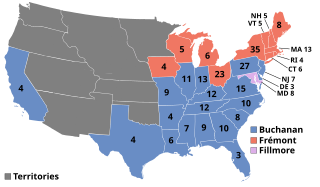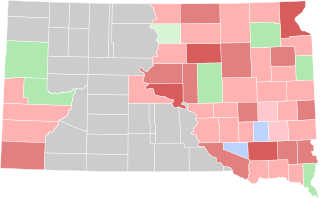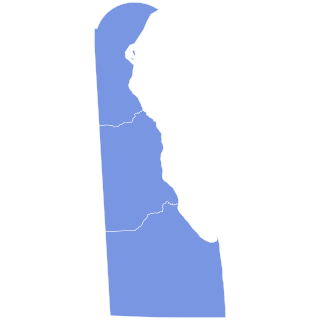
Presidential elections were held in the United States on November 4, 1856. Democratic nominee James Buchanan defeated Republican nominee John C. Frémont and Know Nothing/Whig nominee Millard Fillmore. The main issue was the expansion of slavery as facilitated by the Kansas–Nebraska Act of 1854. Buchanan defeated President Franklin Pierce at the 1856 Democratic National Convention for the nomination. Pierce had become widely unpopular in the North because of his support for the pro-slavery faction in the ongoing civil war in territorial Kansas, and Buchanan, a former Secretary of State, had avoided the divisive debates over the Kansas–Nebraska Act by being in Europe as the Ambassador to the United Kingdom.

John Price Buchanan was an American politician and farmers' advocate. He served as the 25th governor of Tennessee from 1891 to 1893, and was president of the Tennessee Farmers' Alliance and Laborers' Union in the late 1880s. Buchanan's lone term as governor was largely marred by the Coal Creek War, an armed uprising by coal miners aimed at ending the state's convict lease system.

The 1952 Democratic National Convention was held at the International Amphitheatre in Chicago, Illinois from July 21 to July 26, 1952, which was the same arena the Republicans had gathered in a few weeks earlier for their national convention from July 7 to July 11, 1952. Four major candidates sought the presidential nomination: U.S. Senator Estes Kefauver of Tennessee, Governor Adlai Stevenson II of Illinois, Senator Richard Russell of Georgia and Averell Harriman of New York.

The 2008 United States Senate election in Tennessee was held on November 4, 2008, to elect a member of the U.S. Senate from the State of Tennessee. Incumbent Republican U.S. senator Lamar Alexander won re-election to a second term.
The 1848 Democratic National Convention was a presidential nominating convention that met from Monday May 22 to Friday May 26 in Baltimore, Maryland. It was held to nominate the Democratic Party's candidates for President and Vice president in the 1848 election. The convention selected Senator Lewis Cass of Michigan for President and former Representative William O. Butler of Kentucky for Vice President.

Jere Baxter was an American businessman, lawyer, and politician. He was the founder of the Tennessee Central Railroad.

The 2010 United States House of Representatives elections in Tennessee was held on November 2, 2010, to elect the nine U.S. representatives from the state of Tennessee, one from each of the state's nine congressional districts.

The 1890 South Dakota gubernatorial election was held on November 4, 1890. Incumbent Republican Governor Arthur C. Mellette ran for re-election to a second term. He was challenged in the general election by State Surveyor General Maris Taylor, the Democratic nominee, and Henry A. Loucks, the President of the South Dakota Farmers' Alliance and the Independent Party nominee. In part because the left-leaning vote was split, Mellette won re-election, but by a significantly reduced margin, winning a weak plurality with just 44% of the vote. Loucks beat out Maris for second place, receiving 32% of the vote to Taylor's 24%.

The 1894 South Dakota gubernatorial election was held on November 6, 1894. Incumbent Republican Governor Charles H. Sheldon ran for re-election to a second term. Despite facing a thread of defeat at the Republican convention, Sheldon was renominated unanimously. In the general election, he faced Populist nominee Isaac Howe, a Spink County Judge; James A. Ward, the former state chairman of the South Dakota Democratic Party; and Prohibition nominee M. D. Alexander. The election was largely a replay of the gubernatorial elections of 1890 and 1892, with the Farmers' Alliance candidate placing second and the Democratic nominee placing a distant third. This time, however, Sheldon won an outright majority and the Democratic Party's vote share shrunk to just 11%, its worst performance in state history.

The 1892 South Dakota gubernatorial election was held on November 8, 1892. Incumbent Republican Governor Arthur C. Mellette declined to seek re-election to a third term. Former territorial legislator Charles H. Sheldon was nominated by the Republican Party as Mellette's replacement, and he faced former legislator Abraham Lincoln Van Osdel, a leader in the South Dakota Farmers' Alliance and the nominee of the Independent Party, along with Democratic nominee Peter Couchman, in the general election. The result was largely a replay of the 1890 election, with Sheldon winning by a large margin, but only a plurality, and Van Osdel taking second place over Couchman.
John Miller Fleming was an American newspaper editor, attorney and politician, active primarily in Tennessee during the latter half of the 19th century. He rose to prominence as editor of the Knoxville Register in the late 1850s, and worked as the editor of various newspapers, including the Knoxville Press and Herald, the Knoxville Tribune, and the Knoxville Sentinel, in the decades following the Civil War. He also served two terms in the Tennessee House of Representatives, and was appointed Tennessee's first Superintendent of Public Instruction in 1873.

The 1859 New Jersey gubernatorial election was held on November 8, 1859. Opposition Party nominee Charles Smith Olden defeated Democratic nominee Edwin R. V. Wright with 50.76% of the vote.

The 1890 Wyoming gubernatorial election was held on September 11, 1890, as the first gubernatorial election for the newly admitted state of Wyoming. Incumbent Territorial Governor Francis E. Warren ran for re-election as the Republican nominee against former Territorial Governor George W. Baxter, the Democratic nominee. Warren defeated Baxter by a decisive margin and became the first popularly elected Governor of Wyoming.

The 1884 Prohibition National Convention was a presidential nominating convention held at Lafayette Hall, in Pittsburgh, Pennsylvania from July 23–24, 1884, to select the Prohibition Party's presidential ticket for the 1884 presidential election.

The 1884 Tennessee gubernatorial election was held on November 4, 1884. Incumbent Democratic governor William B. Bate defeated Republican nominee Frank T. Reid with 51.24% of the vote.

The 1960 Delaware gubernatorial election was held on November 8, 1960.

The 1952 Delaware gubernatorial election was held on November 4, 1952.

The 1948 Delaware gubernatorial election was held on November 2, 1948.

The 1902 Tennessee gubernatorial election was held on November 4, 1902. Incumbent Democratic governor Benton McMillin did not seek re-election. Democratic nominee James B. Frazier defeated Republican nominee Henry Tyler Campbell with 61.77% of the vote.

The 1888 Arkansas gubernatorial election was held on September 3, 1888.


















